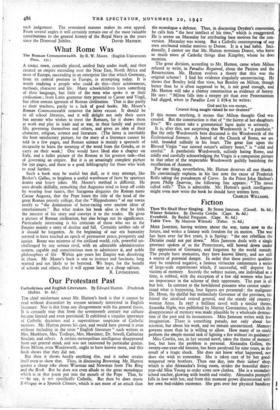What Rome Was
The Roman Commonwealth. By R. W. Moore. (English Universities Press. t5s.)
A SMALL town, centrally placed, unified Italy under itself, and then created an empire extending over the Near East, North Africa and most of Europe, succeeding in an enterprise like that which Germany, from its central position in Europe, is attempting today. It is worth studying a people who could do this—their achievement, methods, character and life. Many schoolchildren learn something of their language, but little of the men who spoke it or their civilisation ; from Latin grammar they proceed to Caesar and Virgil, but often remain ignorant of Roman civilisation. That is due partly to their teachers, partly to a lack of good books. Mr. Moore's Roman Commonwealth removes the latter excuse. It should be in all school libraries, and it will delight not only their users but anyone who wishes to meet the Romans, for it shows them at work and play in trade and at war, in their family and private life, governing themselves and others, and gives an idea of their character, religion, science and literature. (The latter is inevitably the least satisfactory picture, for the story of a literature cannot be told in a few pages, and Roman science is mainly a spectacle of incapacity to learn the meaning of the word from the Greeks, or to carry on their work.) One would have liked also a chapter on Italy, and a fuller picture of the Roman at his greatest task—that of governing an empire. But it is an amazingly complete picture for 25o pages, and there is a good bibliography for those who wish to read further.
Such a book may be useful but dull, or it may attempt, like Becker's Gallus, to brighten a useful warehouse of facts by spurious drama and heavy jokes. Mr. Moore's method is different. He uses details skilfully, remarking that Augustus tried to keep off colds by wearing four tunics, that Saragossa disguises the Roman name Caesar Augusta, that the Pope bears the title of the head of the great Roman priestly college, that the "Hippodromes" of our towns testify to " the domination of horse-racing over ancient ideas of entertainment." But what makes his book alive is that he feels the interest of his story and conveys it to the reader. He gives a picture of Roman civilisation, but also brings out its significance. Particularly interesting is his criticism of those who see in the Empire mainly a story of decline and fall. Certainly neither side of it should be forgotten. At the beginning of our era humanity seemed to have reached an epoch of permanent peace, prosperity and justice. Rome was mistress of the civilised world, rich, powerful un- challenged by any serious rival, with an admirable administrative system, capable and conscientious men to administer it, and noble philosophies of life Within 40o years her Empire was dissolving in chaos. Mr. Moore's book is one to instruct and fascinate, long wanted and not likely to be bettered. We hope, for the benefit of schools and others, that it will appear later in a Cheap edition.
R. LIVINGSTONE.


























 Previous page
Previous page